 danectl - DNSSEC DANE implementation manager. What's DNSSEC? Secure DNS that you can trust. It has become really easy lately. What's DANE? Publishing your TLS keys as secure DNS records (TLSA SSHFP OPENPGPKEY SMIMEA) to prevent impersonation or man-in-the-middle attacks. It could eventually render certificate authorities unnecessary. Currently, it's mostly used for mail servers that want to stop anyone intercepting their incoming email. But the idea also applies to SSH host keys, and OpenPGP a
danectl - DNSSEC DANE implementation manager. What's DNSSEC? Secure DNS that you can trust. It has become really easy lately. What's DANE? Publishing your TLS keys as secure DNS records (TLSA SSHFP OPENPGPKEY SMIMEA) to prevent impersonation or man-in-the-middle attacks. It could eventually render certificate authorities unnecessary. Currently, it's mostly used for mail servers that want to stop anyone intercepting their incoming email. But the idea also applies to SSH host keys, and OpenPGP a
 Detroit is a POSIX platform abstraction layer for creating small and portable desktop applications. Detroit offers simple widgets, even more simpler menu system and extensible DSL language in its core.
Detroit is a POSIX platform abstraction layer for creating small and portable desktop applications. Detroit offers simple widgets, even more simpler menu system and extensible DSL language in its core.
 TRURL G is a free desktop RPN calculator that celebrates the 50th anniversary of the first landing of humans on the earth's moon. Its design is inspired by the Apollo Guidance Computer (AGC).
TRURL G is a free desktop RPN calculator that celebrates the 50th anniversary of the first landing of humans on the earth's moon. Its design is inspired by the Apollo Guidance Computer (AGC).
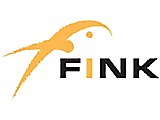 Fink is a package management system for Mac OS X and Darwin systems. It utilizes Debians apt and dpkg tools, while "fink" itself is the source to package building system. The project also adapts sources for broader compatibility with Mac/Darwin systems.
Fink is a package management system for Mac OS X and Darwin systems. It utilizes Debians apt and dpkg tools, while "fink" itself is the source to package building system. The project also adapts sources for broader compatibility with Mac/Darwin systems.
 TRURL A is a calculator app and a technological demonstration for the open RPN engine. Despite its frugality, TRURL A is a fully functional platform-sensitive virtual calculator.
TRURL A is a calculator app and a technological demonstration for the open RPN engine. Despite its frugality, TRURL A is a fully functional platform-sensitive virtual calculator.
 top-like cli interface for container monitoring
top-like cli interface for container monitoring
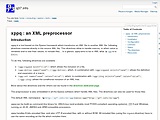 xppq is a command-line tool which transforms an XML file to another XML file, following directives inserted directly in the source XML file. This directives allow to handle macros, to affect value to variables and to test their values, to include files… In a glance, xppq aims to be to XML what cpp is to C/C++. It is developed in C++, and uses only system and C/C++ standard libraries, so it doesn't need third party components. It can run on GNU/Linux (and probably most POSIX-compliant operating s
xppq is a command-line tool which transforms an XML file to another XML file, following directives inserted directly in the source XML file. This directives allow to handle macros, to affect value to variables and to test their values, to include files… In a glance, xppq aims to be to XML what cpp is to C/C++. It is developed in C++, and uses only system and C/C++ standard libraries, so it doesn't need third party components. It can run on GNU/Linux (and probably most POSIX-compliant operating s
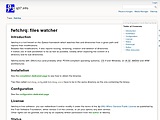 fwtchrq is a command-line tool, based on the Epeios framework, which watches files and directories from a given path and reports their modifications. Besides files modifications, it also reports moving, renaming, creation and deletion of directories. It's written in C++ and makes use of task parallelism to be as fast as possible, notably when exploring the content of a directory and its sub-directories. It uses only system and C/C++ standard libraries, so it doesn't need third party components.
fwtchrq is a command-line tool, based on the Epeios framework, which watches files and directories from a given path and reports their modifications. Besides files modifications, it also reports moving, renaming, creation and deletion of directories. It's written in C++ and makes use of task parallelism to be as fast as possible, notably when exploring the content of a directory and its sub-directories. It uses only system and C/C++ standard libraries, so it doesn't need third party components.
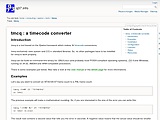 tmcq is a command-line tool which makes timecode conversions. It is developed in C++, and uses only system and C/C++ standard libraries, so it doesn't need third party components. It can run on GNU/Linux (and probably most POSIX-compliant operating systems), OS X and Windows, natively on IA-32, AMD64 and ARM architectures.
tmcq is a command-line tool which makes timecode conversions. It is developed in C++, and uses only system and C/C++ standard libraries, so it doesn't need third party components. It can run on GNU/Linux (and probably most POSIX-compliant operating systems), OS X and Windows, natively on IA-32, AMD64 and ARM architectures.
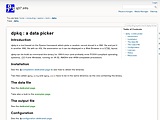 dpkq is a command-line tool which picks a random record stored in a XML file and put it in another XML file with an XSL file association so it can be displayed in a web browser in a HTML layout. It is developed in C++, and uses only system and C/C++ standard libraries, so it doesn't need third party components. It can run on GNU/Linux (and probably most POSIX-compliant operating systems), OS X and Windows, natively on IA-32, AMD64 and ARM architectures.
dpkq is a command-line tool which picks a random record stored in a XML file and put it in another XML file with an XSL file association so it can be displayed in a web browser in a HTML layout. It is developed in C++, and uses only system and C/C++ standard libraries, so it doesn't need third party components. It can run on GNU/Linux (and probably most POSIX-compliant operating systems), OS X and Windows, natively on IA-32, AMD64 and ARM architectures.
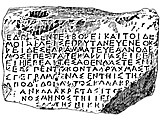 Pukcab is a lightweight, single-binary backup system that stores de-duplicated, compressed and incremental backups on a remote server using just an SSH connection.
Pukcab is a lightweight, single-binary backup system that stores de-duplicated, compressed and incremental backups on a remote server using just an SSH connection.
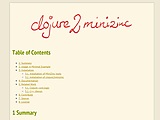 clojure2minizinc provides an interface between state-of-the-art constraint solvers (via MiniZinc) and a very high-level programming language with excellent abstraction capabilities, Clojure. The clojure2minizinc user models in Clojure constraint satisfaction or optimisation problems over Boolean, integer, real number, and/or set variables. clojure2minizinc translates them into MiniZinc, they are solved in the background by a compatible solver, and the result is read back into Clojure. clojure2mi
clojure2minizinc provides an interface between state-of-the-art constraint solvers (via MiniZinc) and a very high-level programming language with excellent abstraction capabilities, Clojure. The clojure2minizinc user models in Clojure constraint satisfaction or optimisation problems over Boolean, integer, real number, and/or set variables. clojure2minizinc translates them into MiniZinc, they are solved in the background by a compatible solver, and the result is read back into Clojure. clojure2mi
|